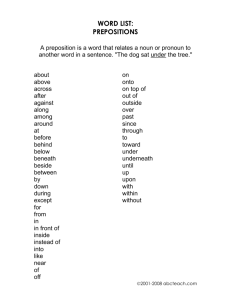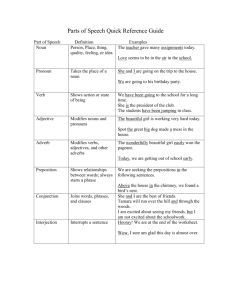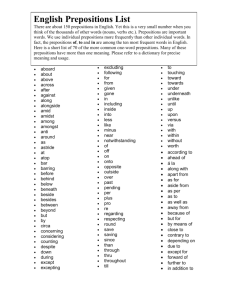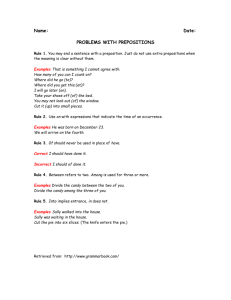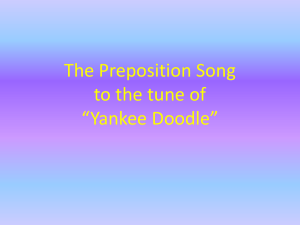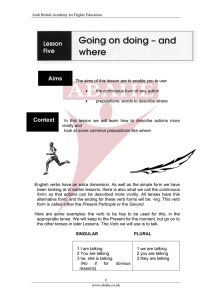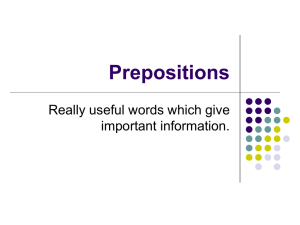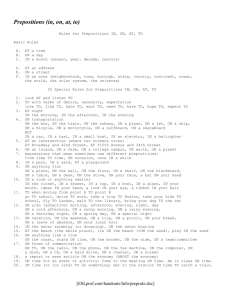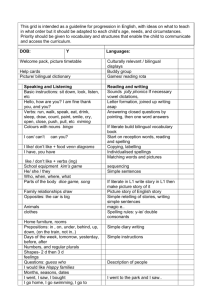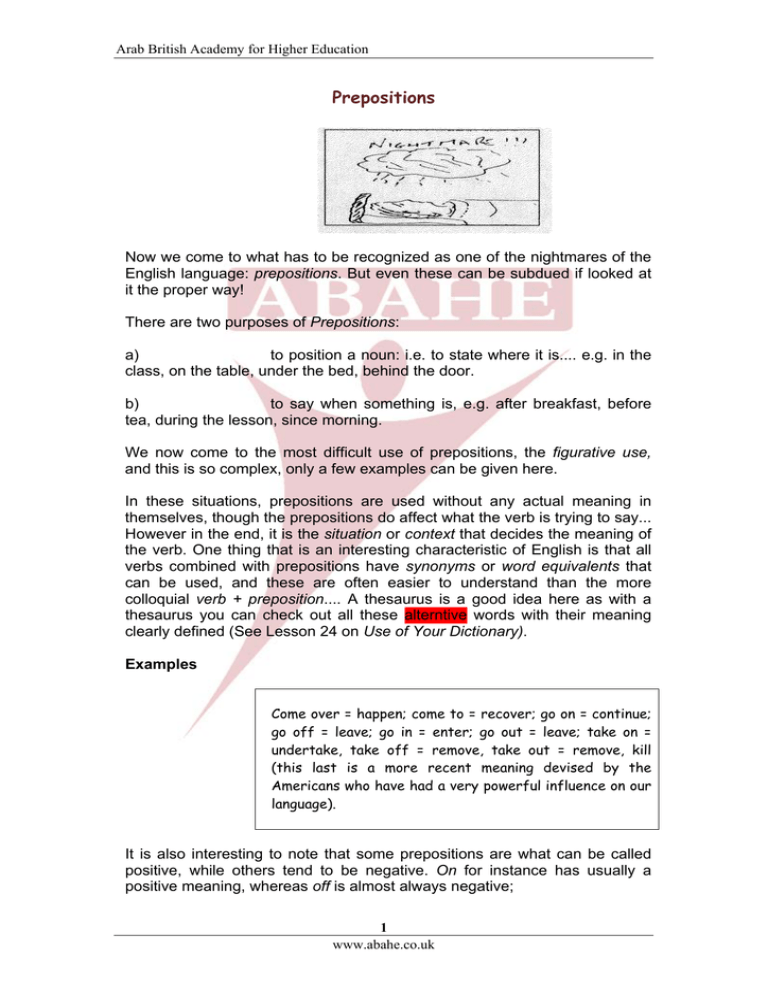
Arab British Academy for Higher Education
Prepositions
Now we come to what has to be recognized as one of the nightmares of the
English language: prepositions. But even these can be subdued if looked at
it the proper way!
There are two purposes of Prepositions:
a)
to position a noun: i.e. to state where it is.... e.g. in the
class, on the table, under the bed, behind the door.
b)
to say when something is, e.g. after breakfast, before
tea, during the lesson, since morning.
We now come to the most difficult use of prepositions, the figurative use,
and this is so complex, only a few examples can be given here.
In these situations, prepositions are used without any actual meaning in
themselves, though the prepositions do affect what the verb is trying to say...
However in the end, it is the situation or context that decides the meaning of
the verb. One thing that is an interesting characteristic of English is that all
verbs combined with prepositions have synonyms or word equivalents that
can be used, and these are often easier to understand than the more
colloquial verb + preposition.... A thesaurus is a good idea here as with a
thesaurus you can check out all these alterntive words with their meaning
clearly defined (See Lesson 24 on Use of Your Dictionary).
Examples
Come over = happen; come to = recover; go on = continue;
go off = leave; go in = enter; go out = leave; take on =
undertake, take off = remove, take out = remove, kill
(this last is a more recent meaning devised by the
Americans who have had a very powerful influence on our
language).
It is also interesting to note that some prepositions are what can be called
positive, while others tend to be negative. On for instance has usually a
positive meaning, whereas off is almost always negative;
1
www.abahe.co.uk
Arab British Academy for Higher Education
Examples
Switch on = positive; switch off = negative; come on = positive; come off=
negative; go on = positive, go off= negative
Other negative prepositions are: under (go under = sink, die); away (go away
= to leave; out (leave out = omit)
But this is a very big area of language and the only way to get familiar with
these specialist uses of the preposition is wide reading; at the end of the
day, the only realistic method of improving one’s English!
The next Activity practises everything we have been looking at in this
Lesson. Before you tackle it, have a look at what you have studied,
especially the first Activity, but try not to look at the Key!
Activity 2
1) Complete the sentences using the Present Continuous of the
verb in the brackets:
a) The express (to travel) _____________ at over 150 miles
per hour.
b) These people (to be) ____________ a real nuisance!
c) We (to have) _____________ a great time at this disco!
d) The cows (to leave, negative) _____________ the field as
it is quite early.
2)
a) Make up sentences using the following prepositions:
under, behind, at, in front of, on top of (These are called
Prepositional Phrases, as to make complete sense you need more
than one word) in, since, after, during.
b) Replace the following verbs with verbs with the same
meaning, but needing a preposition: e.g. to recover
(consciousness) = to come to. Try to make up sentences using
these prepositional verbs. You may use your dictionary if you
need to, but try to learn anything you look up... The Key follows
this lesson.
(i) enter,
(ii) leave,
(iii) happen,
(iv) continue,
(v) undertake,
2
www.abahe.co.uk
Arab British Academy for Higher Education
(vi) seize,
(‘vii) die,
(‘viii) depart
Key
Activity Two
1
a)
b)
c)
d)
The express is travelling at over 150 miles per hour
These people are being a real nuisance!
We are having a great time at this disco!
The cows are not leaving the field as it is quite early
2.
These sentences are only suggestions; consult your tutor if there is
anything you do not understand
a)
i) The cat is under the table
ii) Peter was hiding behind the door.
iii) The children were at school from 9 in the morning until 3 in the afternoon.
iv) In front of the house we have a pretty garden
v)My suitcase is on top of the wardrobe
vi) He put the money in his pocket
vii) She has been here since lunch
viii) After half an hour of study, we get quite tired
ix) Mary left during the film.
b)
i) We go into the house
ii) The train goes out of the station
iii) What came over you?
iv) It goes on raining
v) This is a job I would like to take on!
vi) The big company takes over the small one
vii) It is clear the soldier will soon go under
viii) We will go off early in the morning
All Rights Reserved © Arab British Academy for Higher Education
3
www.abahe.co.uk

